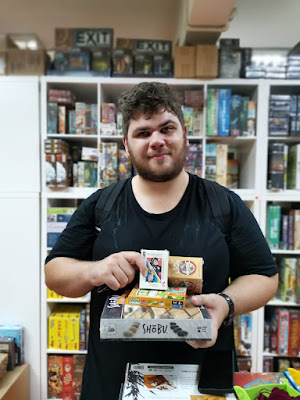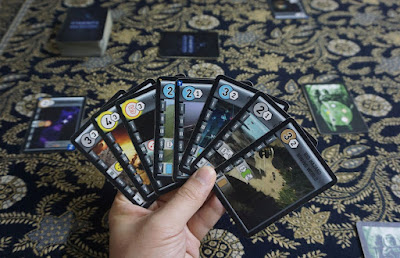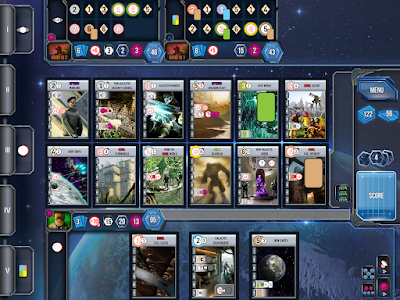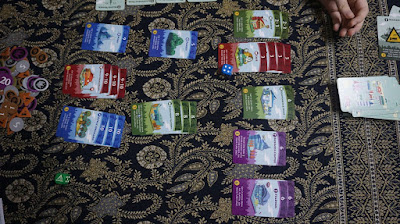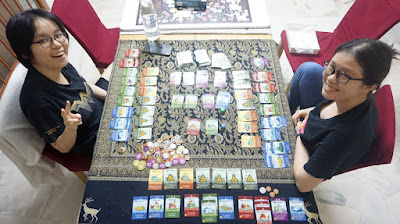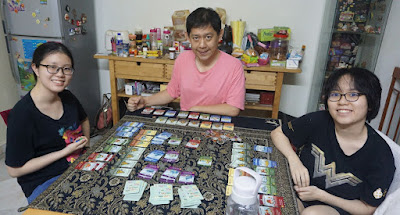The Game
SCOUT is a game from Japan, designed by Kei Kajino. The first edition was released in 2019. In 2022 it was nominated for the Spiel des Jahres, the German Game of the Year. It is a card game. Most people would categorise it as a climbing game. However it is quite different from the typical climbing game. I find it highly innovative and it would be a shame to imagine it as just another climbing game.
The game has a couple of unusual twists. I have read about it before, but at the time wasn't particularly interested in giving it a go. One twist is cards have two ends and they are different (hey, just like Dancing Queen!) You can choose which end you want to use. A second twist is you cannot rearrange your hand, just like in Bohnanza. Most people who review the game mention these two quirks, but by only explaining these two, it is far from sufficient to give an idea of what the game is like.

A game is played over several rounds. Each round you will score or lose points. After a certain number of rounds, the final scores are tallied and the highest scorer wins. A round ends in two ways. Either one player plays all her cards, or she plays a combo which no one else is able to top. The former is just like most climbing games, but the latter is something very different. Typically in a climbing game if no one can top you, you just become the start player for the next run. You get to decide which kind of combo to play, and everyone must play that kind. It is an important advantage to become start player. SCOUT takes this further. If no one beats your combo, you immediately win the round. The stakes and the sense of urgency are much higher here.
When a round starts, all cards are dealt out. When you examine your hand of cards, you already cannot rearrange them. The only choice you have at this point is whether to turn your hand of cards upside down. You don't get to make that decision for individual cards. It's all or nothing. In a sense you are getting two different starting hands and you must pick one.
The combos in the game are simple. You have only singles, straights and same kinds. There is no concept of suit. The colours on the cards don't mean suits. When you play combos, you are not restricted to the combo type or the number of cards. As long as you can play something stronger, you're good. If the start player plays pairs, you are not restricted to play only pairs.
Here's how the combos compare in terms of strength. Firstly, the more cards there are, the stronger the combo. Secondly, same kinds are stronger than straights. Lastly, larger numbers are stronger than smaller numbers. So 1-2-3-4 is stronger than 9-9-9. 4-4-4-4 is stronger than 1-2-3-4. 5-5-5 is stronger than 2-2-2. This feel familiar, but the fact that you can play a combo with more cards than the previous one defies tradition.

To play cards from your hand, you can take them from anywhere, but they must be adjacent, and you cannot rearrange them. A 9-7-8-6 is not a straight, because the numbers are not in the right order. Using this photo above as an example, I can't play 5-5-5 because one of the 5's is separate from the other two. I will need to play the 7 and the 9 before these three 5's would "meet", and then I would be able to play 5-5-5.
Playing a combo means you are beating the previous player's combo. In this case you claim all cards in her combo and put them in front of you. You will score 1 point each for these cards. If you are unable to play a combo, or decide not to, you must take one card from the previous player's combo and put it into your hand. After you select the card, you may turn it upside down before putting it into your hand. Also you may choose any position to insert it. Now this can be a very powerful move, helping you create good combos. If anyone takes a card from your combo, you will score 1 point. This is another way points are scored.
At the start of a round everyone gets a car. This represents a single-use power. When you activate the car, you perform two actions on your turn. You first take a card from the previous player's combo, and you then play your own combo. Normally you only get to perform one action per turn. The car can be a life-saver. Whenever a player is unable to play a combo and is forced to take a card from the previous player's combo, she is effectively also weaking the combo still in play. Fewer cards = weaker. Normally when you take a card, that's already the end of your turn, so you can't immediately play a combo to beat the current combo. The car lets you do this.
Usually when I introduce games, I don't like going into rules details. I would be regurgitating the rulebook. In the case of SCOUT, I find it necessary to explain this many aspects of the game because it really takes this much understanding of the details to be able to appreciate what it's like. Or so I hope. You might still be clueless what playing the game feels like. I encourage you to experience it yourself.
And I'm not even done yet with explaining the game mechanisms. Just one more okay. When a round ends, everyone who is still holding cards loses 1 point per card. This is except for the winner of the round, if she wins by playing a combo no one can top. She may still have cards in hand. They cause no penalty.
The Play
SCOUT is a combination of several unusual rules, and it is difficult to imagine what it's like without actually playing. One key difference from typical climbing games is your hand of cards can grow and can be improved. In games like Big 2 and Fight the Landlord, you have to live with what you are dealt. You plan around that from the beginning. You try to use the strong combos you can make to help you get rid of the weak cards and combos. In SCOUT you can't reorganise your hands, but you can take other players' cards and add them to your hand.
We did a 3-player game, and the game is tense! Your power combo only needs to survive two opponent turns for you to win a round. Let's say I play 1-2-3-4-5-6. If my first opponent can't top that, he'd take one card, let's say the 6, and turn my combo to 1-2-3-4-5. That's still pretty strong, and my second opponent might not be able to top that. If the second opponent uses his car and further weakens my combo to 1-2-3-4 (taking the 5), a straight with four cards is still decent and might not be easily beaten. In SCOUT it is desirable to build strong combos and hope for winning by being undefeated. However if everyone is thinking the same, you might get into a situation of one seemingly strong combo being surprise-beaten by another even stronger combo. Sometimes you get that anxiety of how strong is strong enough. It is highly satisfying to create powerful combos.
The need to keep beating opponents' combos is an ongoing threat. If everyone at the table collectively fails to stop one player, that ambitious combo you are building in your hand just becomes many points you have to lose. It is important to watch the number of cards your opponents have remaining. Like typical climbing games, if they have fewer cards than a combo you are about to play, you know they can't beat you.
If I play the three 1's, and then that 6 on the left, I will end up with the straight 9-8-7-6.
The tokens in the first row are: start player marker, car marker (once-a-round special power) and point token for other players taking cards from your combo. The numbered counters are for keeping score.
This photo and the next are from the same game round. You can compare them.
I played the 9-8 on the right, and then took and inserted a 4, so that I now had a combo of 3-4-5-6. If I played 7-8-9 later, I would be able to link up the 2, making a combo of 2-3-4-5-6.
The Thoughts
There aren't many highly innovative games. I'm glad that SCOUT was nominated for the SdJ. I think innovation in game design should be encouraged. The last time I played a game which gave me a pleasant surprise like this was Regicide. That's a card game too. SCOUT is the kind of game you can play all night over snacks and drinks while chatting. It comes in a small box so it's great for trips with friends. Highly recommended!
